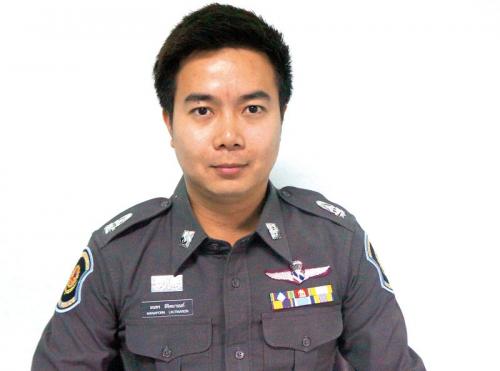Phuket Opinion: Coordinate manpower to corral illegal taxis

Manaporn Likitmanon, a 31-year-old Songkhla native, was a Police Investigator at Samut Sakhon Immigration from 2008 to 2012 before returning south last year to become a Highways Police Inspector covering the tri-province area of Phuket, Phang Nga and Krabi. Here he talks about how to solve the problem of metered and illegal taxis in Phuket.
PHUKET: We have received many complaints about taxis – about drivers who refuse to pick up passengers; who don’t turn on the meter; who abandon passengers during the trip; who are impolite to passengers; and who drive illegal taxis.
The problems are ongoing in Phuket, but I’m confident they won’t be hard to solve if relevant organizations work together to tackle them. I’m absolutely sure we can stamp out these problems, but we need the cooperation of the taxi companies and we also need to strictly enforce the law in order to control the drivers.
The first thing we need to do is have all concerned organizations meet together to improve our understanding of what each groups’ plan for attacking the problems is and how those plans can be coordinated to improve efficiency.
Secondly, the taxi company owners have to train their drivers better. The drivers need to be taught the right way to behave when dealing with customers.
Penalties are also an important way to force taxi drivers to follow the law. Currently, penalties are marginal compared to the amount of money drivers make. Drivers aren’t worried about the penalties for breaking the law because they can earn a lot of money in a short time serving tourists and can pay the fines easily.
The maximum fine for drivers who refuse to turn on their meters is 1,000 baht and the maximum fine for drivers who operate illegal taxis is 2,000 baht.
The penalties must be higher and have a more significant impact on the drivers who are caught breaking the law.
We use checkpoints to catch taxi drivers illegally conducting business, but the way we’ve set them up – once a day for two hours in fixed locations – is not very effective. Drivers who have been caught let other drivers know about the checkpoint by calling, radioing or chatting on social networks.
This is why we catch only a few drivers at a time at checkpoints.
Last month at our checkpoint we caught between 10 and 20 drivers who hadn’t turned their meters on and five drivers operating “black” taxis – not properly registered vehicles. I think this number is very low when compared to the number of taxi drivers actually violating laws in Phuket.
What we need to do is have checkpoints more than once a day, and we need to set them up at different locations, so drivers won’t know about them in advance.
Some people think we should set up checkpoints at the airport itself, but I disagree for two reasons. First, we can’t do it unless the airport asks for it, and second, if the taxi drivers know we are there, they’ll all follow the rules – I’d rather use a checkpoint to catch the drivers who are the rule-breakers.
I’d also like to send in undercover officers to pose as passengers.
However, like many organizations, we have insufficient manpower to do everything we want to do. In addition to catching traffic-law violators on the road, we’re responsible for taking care of special guests who come to the area. This three-province area is very popular and has a lot of special guests, such as those who attended the World Buffalo Congress in early May.
This is another reason we need to cooperate with other departments, to pool our manpower.
We are working with the Phuket Land Transport Office and we also have 30 volunteers helping us with checkpoints and various other projects.
It’s important for Phuket’s tourist image for taxi drivers to turn on their meters every time and to follow the law.
— Irfarn Jamdukor
Latest Thailand News
Follow The Thaiger on Google News:


























